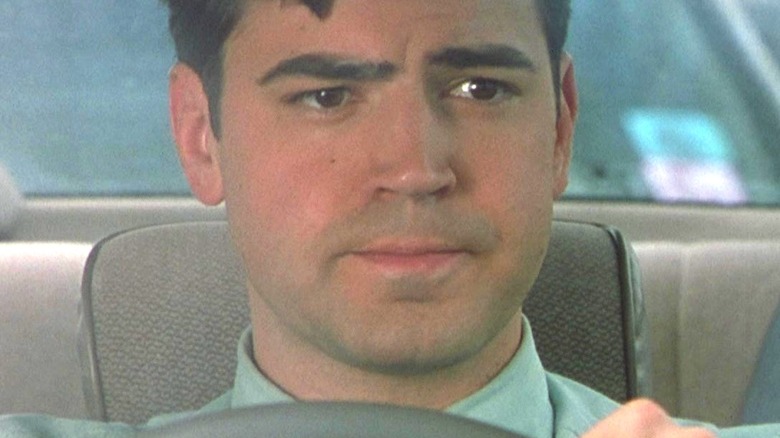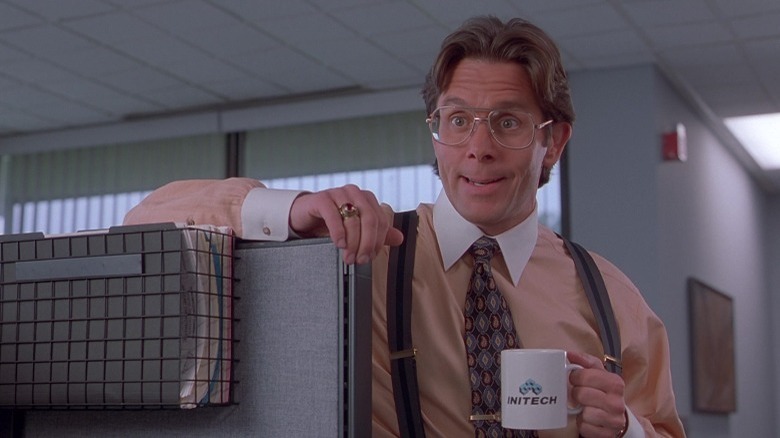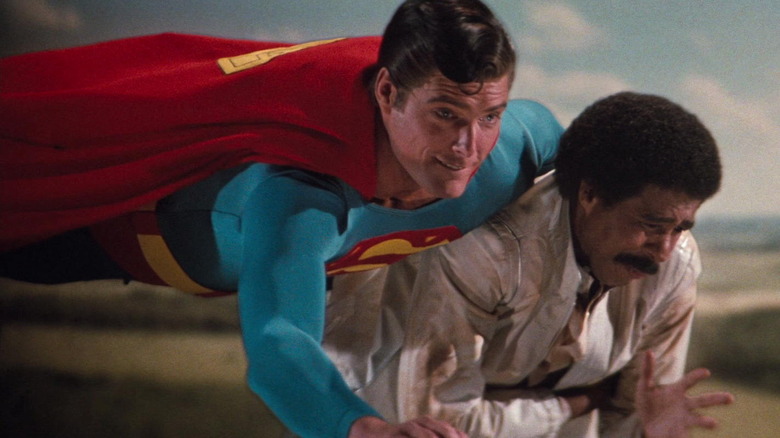Mike Judge's Office Space Inspired A $300,000 Copycat Theft
The 1999 film "Office Space," by "Beavis and Butt-Head" creator Mike Judge, inspired generations to get pissed off at their boss and do something about it. In an interview with Variety, the film's star, Ron Livingston, talked about all the people who have told him that the movie changed their life. "People come and tell me that the movie changed their life. It's like after seeing the movie, it gave them the confidence to get out of whatever it was they were doing that was making them miserable and move on to something else. I only hear from the people for whom that worked out, but hopefully, there's not too many that regret it." For the same article, Variety interviewed Judge, who insisted that he's never heard from anyone who quit their job because of the movie and ended up on welfare.
That isn't the only impact that the film has had on the real world. In an interview with Deadline, Judge said that one of his assistant directors once asked TGI Friday's why they no longer wear the multitude of buttons or "flair" depicted in the film, and the assistant director was informed that they got rid of them because of the movie. "So, maybe I made the world a better place," Judge said about the restaurant chain's decision.
It's one thing to quit your job or getting rid of the ridiculous buttons on your uniform, but one software engineer from Washington state let himself get a little too carried away with inspiration from the film, and it landed him in a lot of trouble.
Someone tried the software scheme from the movie
According to The Wrap, Ermenildo "Ernie" Castro, a software engineer from Washington State, was recently arrested for launching a scheme inspired by "Office Space." Castro found a way to change the programming code so that he could change prices and steal shipping fees on the website Zulily. It probably didn't help his case that police found a file on his computer labeled "Office Space Project." Castro even admitted in court that the movie inspired him in coming up with his plan. Like in the movie, Castro managed to steal more than $300,000 from the company. But while everything turned out okay in the end for the characters in the movie, Castro is scheduled to appear in court on January 26th, where he faces charges of first-degree theft and first-degree identity theft.
Response on social media was far from outraged over Castro's criminal activity, as most people seemed to find the situation funny more than anything else. Both @robhughesyyc and @mayhemwriting made the same joke about the situation tweeting "Damn, it feels good to be a gangsta," the title of a song by the hip-hop group Geto Boys, which appeared in the film. Meanwhile, @FinanceKO tweeted, "Legends dont die" while @not_anth called Castro a "hero." Considering these reactions, the prosecution in Castro's case may want to push for a jury that hasn't seen the movie.
The Office Space scheme is from Superman 3
"Office Space's" money scraping scheme may be what inspired a software engineer to try the method out in real-life, but the classic Mike Judge film actually derived this particular plot point from another movie entirely. If you can believe it, "Office Space" borrowed this crafty little scheme from one of the many "Superman" movies — specifically, Richard Lester's 1983 movie "Superman 3." One of the plot threads for the flick sees a computer programmer enact the very same money scheme, a technique known in real-life as salami slicing (via Snopes), and he ends up getting blackmailed once he's caught. "Office Space" is pretty explicit about this inspiration too. After Michael suggests the plan, Peter notes that it "sounds familiar," to which Michael replies in no uncertain terms: "Yeah. They did this in Superman 3."
Of course, the salami slicing scheme in "Office Space" actually works out for the characters, as opposed to how it turns south in "Superman 3." This illegal technique doesn't have a great success rate in real-life either. Prior to Ermenildo Castro's case, similar attempts were eventually thwarted, such as a parking meter mechanic who was caught in 2011 for stealing $210,000 worth of quarters from his job over the course of eight years (via The National Post). All things considered, this is one mastermind plan that should probably be left to fictional characters.


